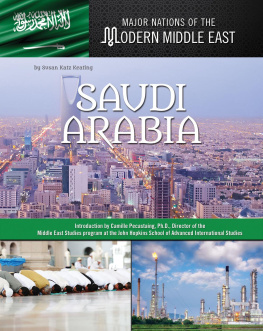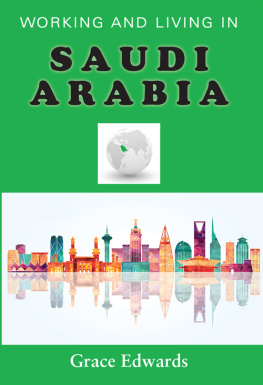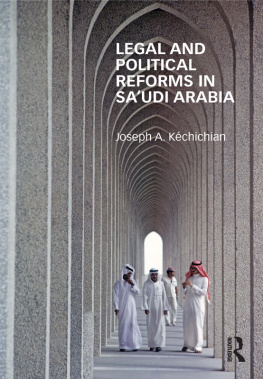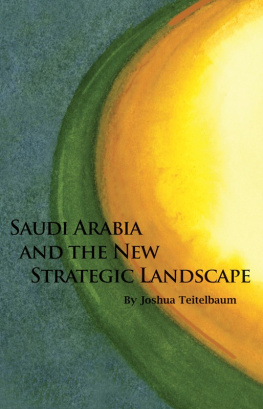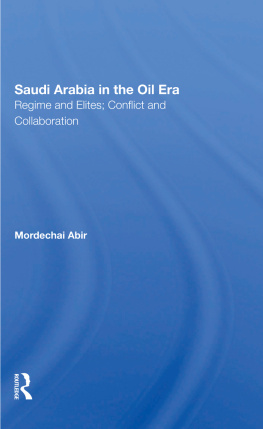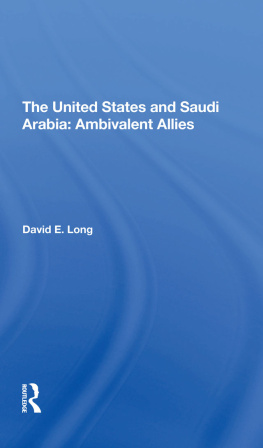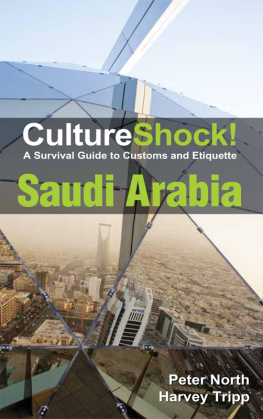ROUTLEDGE LIBRARY EDITIONS:
SAUDI ARABIA
Volume 2
THE COHESION OF SAUDI ARABIA
THE COHESION OF SAUDI ARABIA
Evolution of Political Identity
CHRISTINE MOSS HELMS
First published in 1981
This edition first published in 2015
by Routledge
2 Park Square, Milton Park, Abingdon, Oxon, OX14 4RN
and by Routledge
52 Vanderbilt Avenue, New York, NY 10017
Routledge is an imprint of the Taylor & Francis Group, an informa business
1981 Christine Moss Helms
All rights reserved. No part of this book may be reprinted or reproduced or utilised in any form or by any electronic, mechanical, or other means, now known or hereafter invented, including photocopying and recording, or in any information storage or retrieval system, without permission in writing from the publishers.
Trademark notice: Product or corporate names may be trademarks or registered trademarks, and are used only for identification and explanation without intent to infringe.
British Library Cataloguing in Publication Data
A catalogue record for this book is available from the British Library
ISBN: 978-1-138-82515-4 (Set)
ISBN: 978-1-138-84576-3 (Volume 2)
Publishers Note
The publisher has gone to great lengths to ensure the quality of this reprint but points out that some imperfections in the original copies may be apparent.
Disclaimer
The publisher has made every effort to trace copyright holders and would welcome correspondence from those they have been unable to trace.
THE COHESION OF
SAUDI ARABIA
Evolution of Political Identity
CHRISTINE MOSS HELMS
1981 Christine Moss Helms
Croom Helm Ltd, 2-10 St johns Road, London SW11
ISBN 0-7099-0441-X
Reproduced from copy supplied
printed and bound in Great Britain
by Billing and Sons Limited
Guildford, London, Oxford, Worcester
CONTENTS
To
MOTHER
AND
ABU CHRISTINE
This book is the outcome of five years of research for my doctoral thesis. After many alternate moments of frustration and exciting discovery, it is pleasant to find that my one remaining responsibility is to express my appreciation to all those persons who and institutions which assisted me. It is appropriate that Oxford University, the academic traditions of which are hundreds of years older than the founding of my own country, should head this list. Not only was the educational experience challenging, but also I incorporated much from the environment and living experience that cannot be classified as strictly academic but was, none the less, a valuable experience. I would especially like to thank Mr Albert Hourani and Professor A. F. L. Beeston, both of whom are well known for their scholarship and selfless devotion of time and encouragement to students, and Dr John Wilkinson, whose ideas stimulated the direction of my research.
There were also many people who added to my excitement for the Middle East because they played a special part in history as explorers, diplomats or soldiers. Among those who personally gave me their time and candid opinions were Lieutenant-General Sir John Bagot Glubb, Major-General James Lunt and Wilfred Thesiger. After meeting each of these men, it was not difficult to understand why their names are legendary in the countries in which they have travelled and worked. I would also like to thank Mrs Glubb and Mrs Lunt who, on behalf of their husbands, offered the hospitality of their homes and had many stories of their own to tell me about their travels in the Middle East.
Officials at the Embassy of Saudi Arabia in London and Dr Morsey Abdullah of the Arab Documentation Centre in Abu Dhabi contributed their time and source material. Mr William Mulligan (ARAMCO), through the kind auspices of Mr Caspar Weinberger, assisted me with a number of inquiries and also provided me with a copy of Madanis manuscript.
There are many friends in Jordan and Abu Dhabi, unfortunately too numerous to mention individually, who offered me the hospitality of their countries and homes. In this regard, however, I cannot fail to mention Mrs Maysun Oweiss and her husband, the late Ambassador from Jordan to Rumania, whose generosity, friendship and home were always open to me. Shaikh Nahyan b. Mubarak Al Nahyan and Mr Alamgir Masud also contributed to my understanding of various aspects of the badu, their social organisation, politics and language.
Colonel and Mrs F. M. Johnson are also two people with whom I have shared and learned a great deal about the Middle East and who have unceasingly offered their friendship. Finally, special thanks to my parents, without whose challenges and encouragement none of this would have been possible.
Research for this study was conducted at the India Office Records in London and the Middle East Centre at Oxford University. Unpublished Crown Copyright material in the India Office Records reproduced in this book appears by permission of the Controller of Her Majestys Stationery Office. This material consisted of Britains collected Political and Secret Department Papers which documented its knowledge of the activities of and its involvement with Abd al-Aziz b. Abd al-Rahman Al Faisal Al Saud from 1902 to 1931. The Middle East Centre at Oxford contained a variety of additional material: the Philby Papers, collected writings of Muhammad b. Abd al-Wahhab, The United Kingdom Memorial and The Saudi Memorial concerning the arbitration over the Buraimi Oasis dispute, and a number of recent publications in Arabic. The Saudi Embassy in London kindly provided Arabic copies of its treaties with Great Britain and Attars biography of Abd al-Aziz. I also obtained a number of unpublished diaries and dissertations, all of which are listed in the first section of the bibliography. Among them, however, are Captain W. H. Shakespears private papers, loaned to me by Major-General Lunt, and General S. S. Butlers journal of a trip to Northern Arabia in 1908. The significance of this fascinating journal, with photographs of the area around Jabal Shammar and of the Al Rashid, only recently came to light when Butlers family donated the memoirs of his later life in Africa to Rhodes House at Oxford University. General Butler was undoubtedly one of the first, although uncredited, explorers of Arabia. All other sources are fully identified in the footnotes and bibliography.
Although I am deeply grateful for all the assistance I have received, I acknowledge that all conclusions in this study are my own.
Christine Helms
Oxford
It would be impossible to enumerate every convention which has been adopted, but it is hoped the following pages will list those of greatest importance.
Transliteration
It has been decided for the sake of simplicity to omit the transliteration of Arabic words in the main body of the text although they have been transliterated in the notes, bibliography and index for those who are interested.


